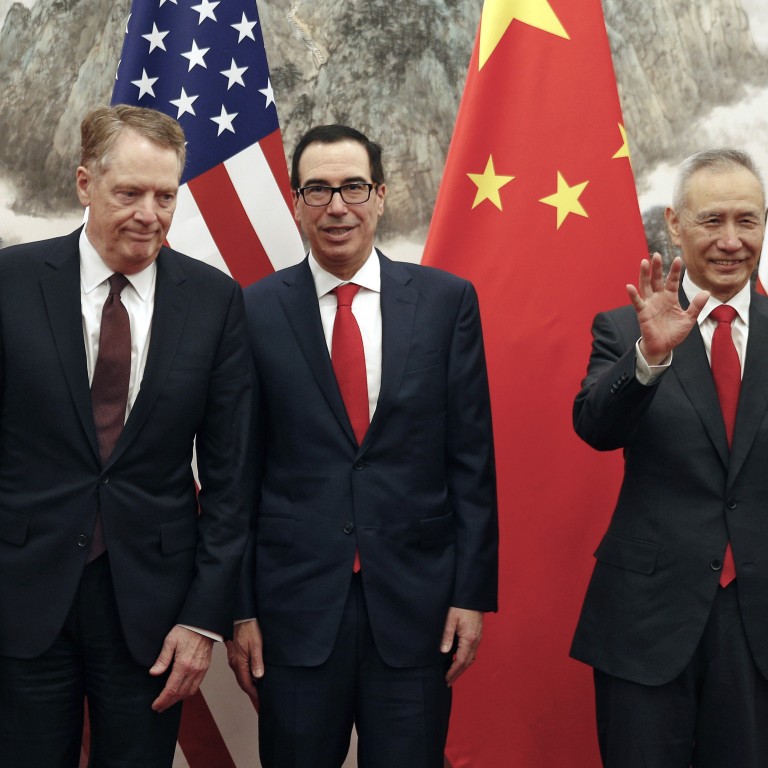
The US-China trade war talks are back on but no high hopes for Xi-Trump deal at G20
- Top Chinese and American negotiators expected to return to discussions in Osaka before bilateral summit
- Observers say the best-case scenario is an agreement to halt further escalation of the conflict
Top Chinese and American trade negotiators have agreed to resume talks over their escalating trade feud, just days before high-stakes talks between the two countries’ presidents at the Group of 20 summit in Japan.
The commitment was made in a phone call on Monday between Chinese Vice-Premier Liu He, President Xi Jinping’s point man for trade talks, and his US counterparts, Trade Representative Robert Lighthizer and Treasury Secretary Steven Mnuchin.
It came as both sides sought to dampen expectations of a quick resolution to their spiralling tariff war.
There were few details about the call but China’s Ministry of Commerce said it was at the US’ request and involved an “exchange of opinions on economic and trade issues”.
Just a week earlier, Xi and US President Donald Trump agreed to meet on the sidelines of the G20 in Osaka and restart negotiations that had been suspended since early May.
Analysts said they expected Liu, Lighthizer and Mnuchin to meet in Osaka in the next few days to pave the way for the Xi-Trump meeting, which is scheduled for Saturday, the second day of the summit, according to a US official.
Why Asia-Pacific nations don’t want to take sides in the US-China trade war at the G20
Huang Jing, a professor at Beijing Language and Culture University’s Institute of International and Regional Studies, said the negotiators would now be scrambling to compile a list of key disagreements and possible concessions.
Like the G20 Buenos Aires summit seven months ago, the Osaka gathering looks set to be overshadowed by the protracted US-China trade war, with Xi-Trump summit widely seen as another make-or-break moment for the world economy.
However, given deepening distrust between Beijing and Washington and their stand-off on trade and technology amid broader geopolitical tensions, officials and observers on both sides of the Pacific are largely pessimistic about the prospects of any breakthroughs.
Although stakes are high for both countries and the global economy, they say the best-case scenario is probably an agreement to halt further escalation of the trade war, or a temporary truce on new tariffs, similar to the one reached at the end of the Argentina summit in December.
“The leaders are expected to show a rational and cooperative attitude when they meet again and agree to restart suspended trade talks,” said Zhu Feng, a professor of international relations at Nanjing University.
“But it remains to be seen whether they have the political will and wisdom to settle their differences which are rooted in entrenched domestic politics in both countries that goes far beyond trade rifts. Frankly, I am not sure if it will happen any time soon.”
Is the G20 destined to fade into irrelevance in a leaderless world – courtesy of Donald Trump?
Beijing and Washington have been locked in a trade war for a year, having slapped tariffs of up to 25 per cent on imports of each other’s products. The US is holding public hearings on a list of Chinese products – largely consumer and electronic goods – worth about US$300 billion, on which it would impose new tariffs if trade tensions escalate further.
In a briefing call on Monday, a senior US administration official, who spoke on condition of anonymity, said that the leaders’ meeting would aim to rebalance economic relations and move towards a deal for a trade war truce that was enforceable.
“The purpose of the discussion is to rebalance the economic relations in a way that protects US economic prosperity, workers, and of course that also means the kinds of structural changes that would need to take place to protect intellectual property,” the official said.
The official said Trump was “comfortable with any outcome” of the meeting with Xi because the US was in a strong position.
A US industry source said Beijing was cautious about the outcome of the meeting, which could set the tone for future trade talks. There were also still huge gaps on some key issues, which led to the collapse of the previous trade talks, the source said.
“The Xi-Trump meeting is more of a symbolic gesture than substantial and it’s unrealistic to expect top leaders to iron out details of any concrete results. Its significance largely lies in the fact that both sides agree to resolve their disputes through negotiations and are willing to show some flexibility to accommodate each other’s concerns,” Huang said.
As trade war continues, are the US and Chinese economies heading for a messy divorce?
But he added that both Xi and Trump were under enormous domestic political pressure and could not afford to look weak in the trade war.
While Trump has launched his re-election campaign amid bipartisan consensus over his confrontational approach on China, Beijing has resorted to nationalism in the midst of the deteriorating ties with the US and Europe and a deepening economic slowdown.
Wang repeated that both sides should negotiate on the basis of equality, respect each other’s sovereignty and World Trade Organisation rules, and benefit both sides.
Assistant foreign minister Zhang Jun also said on Monday that Beijing would seek a united front against protectionism at the G20, in a veiled swipe against Trump’s isolationist “America first” agenda.
Additional reporting by Owen Churchill


